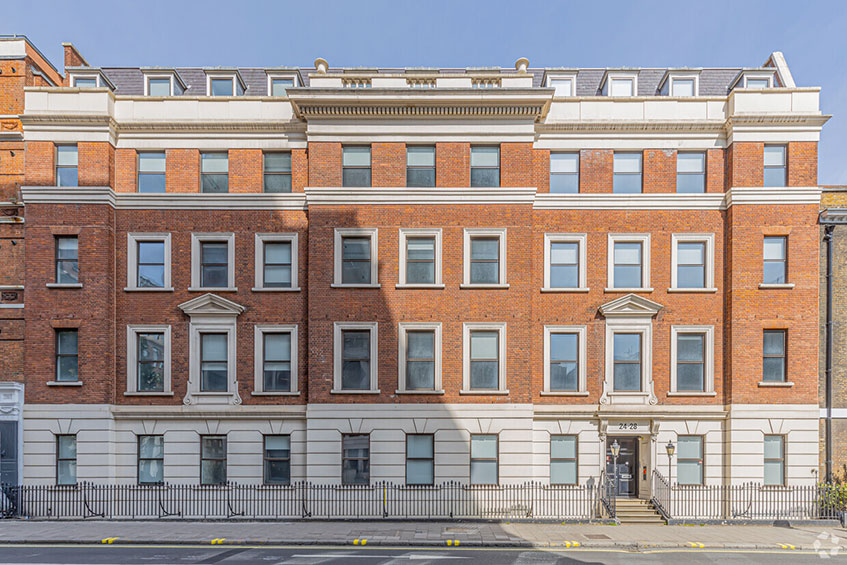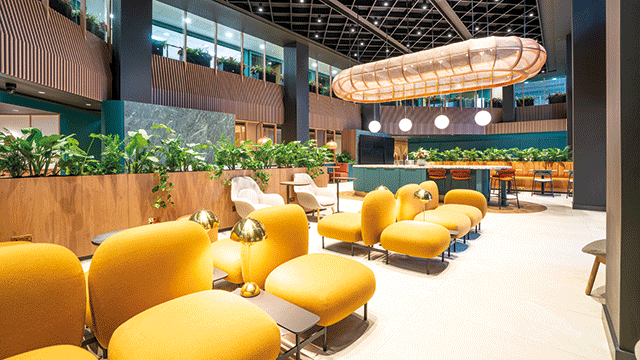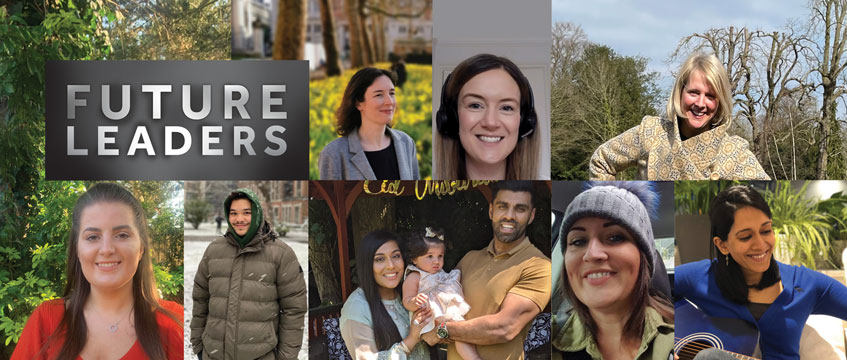EG’s award-winning Future Female Leaders programme has evolved. And while we are still huge supporters of women in the built environment and the need for more women in senior positions, the sector’s diversity issue goes much deeper than just gender.
This latest iteration seeks to rebalance real estate across the spectrum, providing a platform – and a very big stage at the end of the programme – to eight amazing Future Leaders showcasing the importance of diversity in all its forms, from gender and sexuality to ethnicity, background and neurology.
It is set to be a showstopper of a programme. Here, all eight Future Leaders reveal just why.
ALEXANDRA WOOLMORE
Head of planning, Argent
What made you want to take part in the Future Leaders programme?
I’m not a natural performer and have always been hugely anxious about speaking to a large crowd. While I generally have no problem contributing to a discussion in smaller, more informal groups, I have often struggled to translate this apparent confidence into larger public settings. When the opportunity to apply came up, I knew it was something that I really needed to do, both professionally and for myself. I looked at the profiles of the previous cohort and the reasons they gave for taking part, and instantly recognised the fears and psychological challenges that each one of them spoke about. It was a bit of a “that’s me” moment.
What impact do you hope to have by taking part in the programme?
Numerous studies show that self-doubt and “imposter syndrome” are far more prevalent in professional women, women of colour and the LGBTQ community. I recognise these feelings, particularly in relation to public speaking, where I have previously experienced significant doubt around my professional voice. In a world where successful leaders seem to be measured by the confidence they exude and the public profile they have built, it can sometimes feel like you have to create an alter ego to succeed. I would like to demonstrate that there is no “one size fits all” to good leadership, and that to create real diversity within the industry, being authentic is more important than being the loudest voice in the room.
What will success look like for you at the end of the programme?
At the end of the programme, I would like to be able to accept invitations to speak without flinching, knowing that I am able to control the nervous anticipation of public speaking and can confidently deliver an engaging talk without notes. I also want to surprise people (myself included) who think this kind of thing “isn’t me”.
ROBIN DIDIER
Assistant asset manager, Ellandi
What made you want to take part in the Future Leaders programme?
I’m a creative person at heart, and part of that has always included writing my own story. Jumping at new opportunities when they arise has never failed me, so why not? Just thinking about applying made my heart beat out of my chest and my palms started sweating – that was my sign from the universe to go for it.
What impact do you hope to have by taking part in the programme?
I’ve quickly come to learn that being different has a lot more value than you even realise. There are so many unique people that we need to celebrate within our industry, and I’m hoping that by doing this, people who may be feeling out of place realise that there is an open seat at the table for them.
What will success look like for you at the end of the programme?
Completion of the programme is my own version of success. I’m trying to break out of my shell and discover sides of myself that I didn’t know were there, or perhaps they’ve always been there but I just relegated them to appear when I’m alone in my room. Success is overcoming those fears of judgement.
TANYA COEN-D’ARCY
Regional facilities manager, JLL
What made you want to take part in the Future Leaders programme?
I stepped off the career ladder for a number of years. Since joining JLL five years ago I have found a career path I never knew existed in facilities management. Working in FM, no two days are the same. FM organisations are now leading the way in innovation, sustainability and wellbeing in the quest for the workplace of the future, which offers a real opportunity to make a difference to people’s lives and wellbeing. Having been away from the corporate world for so long, I have at times struggled with “imposter syndrome”, frequently believing someone would ask why I am here. To quieten that negative voice, I have actively looked for ways to challenge myself while developing my leadership capabilities. The Future Leaders programme ticks both those boxes: it will help me develop as a leader, while well and truly taking me out of my comfort zone.
What impact do you hope to have by taking part in the programme?
I come from a working-class background and didn’t go to university. I have gaps in my CV. All the things that on paper might mean I’m not an ideal candidate to be successful. I hope to inspire women retuning to work or people with less than traditional work experience to believe in themselves. I also hope to make employers in the industry think about their recruitment policies. We all have something to bring to the table, however or wherever we learnt those skills. In the right field of work we can use them and thrive.
What will success look like for you at the end of the programme?
If I am able to stand up in front of a group of my peers and deliver an articulate, powerful, engaging or inspiring talk then it will be a success. Moreover, if I can get through it without that negative voice in my head, it will be a complete success.
JENNIFER OFFORD
Senior planning and enabling manager, Homes England
What made you want to take part in the Future Leaders programme?
As a town planner who discovered my dyslexia at the age of 35, I believe passionately that we need to bring neurodiversity out of the shadows. I am excited by the platform that the Future Leaders programme will offer to encourage conversations about collaboration and diversity of thought.
What impact do you hope to have by taking part in the programme?
By becoming an EG Future Leader, I hope to have lasting impact across our industry by bringing neurodiversity to the forefront of how we all think about inclusion across the property sector. Understanding this topic is important for the future of work and our use of technology; it is also relevant for how we design places and the way that we engage with communities.
What will success look like for you at the end of the programme?
I love this from Ginger Leadership Communications [which provides the training for EG’s Future Leaders]: “An audience listens, a community reshares.” The test of success for me will be if I can inspire others to start recognising and supporting neurodiversity in their own teams. I hope to see more people joining neurodiversity networks across our sector too.
CLARE GRIMES
Commercial operations manager, Octopus Real Estate
What made you want to take part in the Future Leaders programme?
Having studied sociology at undergraduate level at Loughborough University, I have always been passionate about the concepts of social mobility and diversity. My company has provided me with ample opportunities in the past few years, supporting my master’s degree at Henley Business School and my progression to MRICS. The wider real estate industry has also provided me with so many opportunities to learn. That being said, there remain significant barriers for people from non-typical backgrounds entering the real estate sector. This needs to be addressed at the earliest opportunity, and at the highest levels. Being involved in the Future Leaders programme will give me the opportunity to share and continue my passion for this subject. I will be able to drive change within the sector. The opportunity to represent Octopus Real Estate on such a provoking topic feels like the opportunity I have been waiting for.
What impact do you hope to have by taking part in the programme?
I think the industry is already thinking differently about diversity and inclusion. D&I is no longer being viewed as a “side of desk” project that people pick up as and when they have time to squeeze it in between their day jobs. Diversity and inclusion is now becoming people’s day job. There is still significant progress to be made, however, and I believe that we can always do better. There is no doubt that real estate has an impact throughout every step of someone’s life, and they interact with property in some way every single day. I want the real estate sector to challenge itself to think differently and act with immediacy to instigate positive change in the sector. I also hope to inspire more females and those from lower socio-economic backgrounds to pursue a career within the real estate fund management space.
What will success look like for you at the end of the programme?
My role requires me to communicate with a number of key stakeholders. These stakeholders tend to be smaller groups of people that we work with on a regular basis. Being in the early years of my career, there are few opportunities to address large groups of people. By the end of this programme, I want to gain the confidence and self-belief to do this. Self-doubt can hinder career progression, and I want to nip this in the bud as soon as possible. In addition to this, I also want to go one step further and inspire others to have the confidence to do the same. In a few years, I hope to move into managerial positions where I will lead teams. This programme will give me the skills to be a leader who inspires others. The programme is about the whole process; however, success at the end of the programme will be direct action being taken by industry players once they have listened to my speech.
ANTARA SUNDARARAJAN
Development director, Oxford Properties
What made you want to take part in the Future Leaders programme?
It feels like an exciting time to be part of the industry – real estate is ripe and bursting with potential for innovation along with a greater understanding of the responsibility we have, at the heart of what we all do, to the communities we help to create and thrive. While I am driven to contribute to this disruption, I recognise that passion alone cannot effect meaningful change, and while it is a necessary condition, it is not sufficient and is no substitute for clarity, composure and coherence. The programme’s focus on public speaking training is something I am hopeful will help give me the support, structure and focus to help build my courage of conviction and gravitas and silence my constant inner critic (who regularly feels much more articulate and self-assured than I am and therefore, frustratingly, always seems to win the argument about whether I am capable or have anything interesting to say). At the same time, it would be great to feel OK to speak up without having achieved perfection, and for others also to recognise the value in allowing ourselves to be vulnerable.
What impact do you hope to have by taking part in the programme?
Both the increasing diversity within real estate and the dialogue around these themes has been great to witness. However, my view is that true and sustainable change requires a real and widespread belief that: a) inclusion is arguably more important than diversity; and b) people truly start to see the value in diversity through a carrot approach (motivation for successful outcomes and therefore a true belief in the value of D&I) rather than a stick approach (rules and regulations). My overarching hope from being involved in the programme is that it will help accelerate and reinforce my reach and effectiveness by providing a platform, raising my profile and helping me create connections and learn from others, so that I may contribute to a diversity of thought and perspectives at least in some small way. I am keen to make sure that the learnings and opportunities from the programme don’t remain just with me and that I am also able to pay forward the exposure to and support from the visibly strong, successful senior women I have known throughout my career. Perhaps I can represent someone similar to others who may see themselves in me. Finally, I’d love to contribute to changing the wider public perception of real estate.
What will success look like for you at the end of the programme?
Changing even one heart or mind about the value of collaboration, encouraging alternative viewpoints and championing those who don’t quite look, think or act like them would feel incredible, because it takes only one person to create a ripple effect. Likewise, if I could make one student rethink real estate as a career or someone reconsider their understanding of landlords, developers or real estate investors. I’d hope the network of leaders within the programme can continue to learn from one another and hold ourselves and each other to account even after this year. From a personal point of view, I would love to get to a point where I can overcome my vulnerability hangover (in the words of Brené Brown) from this experience. I would feel successful if I could develop my confidence to push boundaries, continue to question the status quo (#ChooseToChallenge) and be able to deliver impactful messages in a way that progresses dialogue and inspires action on issues that matter within my organisation and the wider industry.
ZAMAN SHEIKH
Asset manager/commercial property surveyor, Southend-on-Sea Borough Council
What made you want to take part in the Future Leaders programme?
I have high aspirations in my career and I want to do everything I can to make a positive impact on the industry. In the next few years, I would like to be a significant figure of influence within the property industry, while representing the BAME community specifically. Ultimately, I would like to be a future leader, and the skill to speak publicly is a quality and a trait that all good leaders have.
What impact do you hope to have by taking part in the programme?
I want to act as an ambassador for the BAME community and encourage those from under-represented backgrounds to take up a career within the property sector, and to encourage diversity. I believe that with diversity comes innovation, and the property sector needs innovation and new creative ideas. Tackling inequality and discrimination in the workplace is something I feel very passionately about. Although I believe this is something that does not occur as much as it did in the past, it still happens. I want to be given a platform from which I can generate awareness and educate people about the principles related to the Equality Act 2010, in order to tackle any form of discrimination, whether that be in the workplace or otherwise.
What will success look like for you at the end of the programme?
Success for me would be an increased sense of self-confidence and self-awareness, particularly in the ability to talk about sensitive topics and deliver presentations to large crowds. Hopefully, I will also be able to influence a younger individual from an under-represented background to take up a career in property.
GEORGINA WATT
Senior associate, Taylor Wessing
What made you want to take part in the Future Leaders programme?
I am passionate about diversity and inclusion, and with the programme being aimed at highlighting diversity in all of its forms in the real estate sector, I had to apply. There is a huge imbalance in the industry at present in relation to all forms of diversity, and it needs to be addressed to promote a more competitive, balanced and successful sector. With the cohort being identified as Future Leaders within their respective fields, it will be enlightening to see how other businesses within the industry are addressing this issue.
What impact do you hope to have by taking part in the programme?
Having access to this experience and the coaching provided throughout the programme is a huge privilege. I hope to be able to use the transferable skills and insight gained to pass the same on to the next generation of future leaders, both internally at Taylor Wessing and externally, and to show others that you can have impact while remaining authentic to yourself.
What will success look like for you at the end of the programme?
Pushing myself out of my comfort zone in order to be capable of delivering a TEDx-style speech… on a stage… to hundreds of people. I am still not convinced that it is possible, and the thought alone currently makes me feel nauseated. Why did I sign up to this again?
Stage presence
 EG’s second cohort of Future Female Leaders are still undergoing their training with Ginger Leadership Communications and will be coming to a very special stage later in the year.
EG’s second cohort of Future Female Leaders are still undergoing their training with Ginger Leadership Communications and will be coming to a very special stage later in the year.
To keep up to date with their progress and all our Future Leaders talent, click here.
To send feedback, e-mail newsdesk@egi.co.uk or tweet @estatesgazette



















